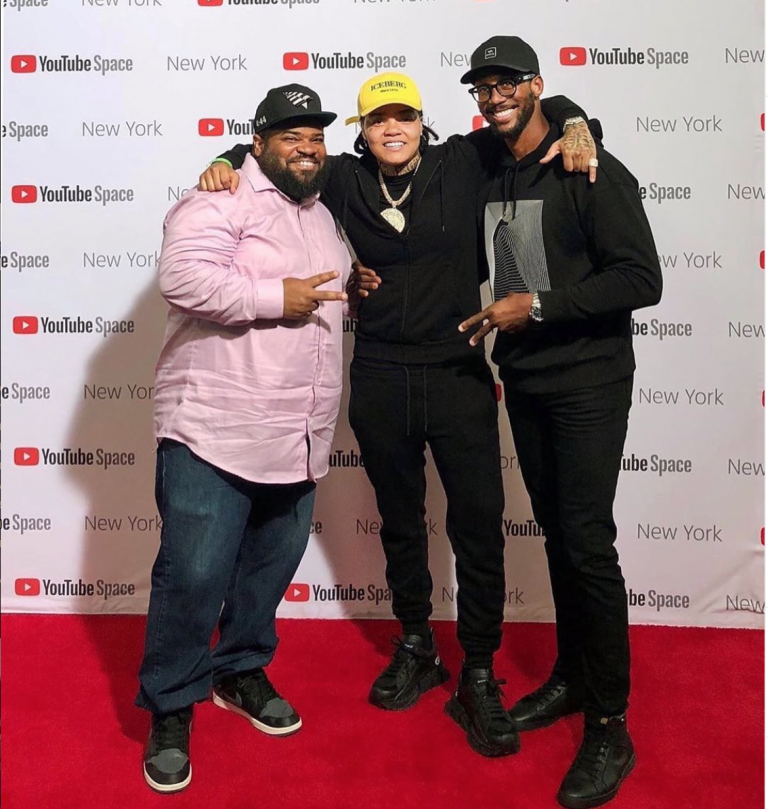
Korff School alum’s music can be heard on multi-platinum recording artist albums
calendar icon20 Sep 2021

Lincoln, Neb.--Orrin Wilson graduated from the University of Nebraska–Lincoln’s Glenn Korff School of Music in 2011 with a DMA in trumpet performance. Today, he’s part of the music production duo called “velocitymadeit,” whose music can be heard on multi-platinum recording artist albums from Chris Brown, Young M.A., Lil Wayne, and more.
“It’s quite shocking to hear music that you sit alone in your room in front of a computer for hours trying to get the right ideas, or you’re in a studio with an artist, trying to come up with something that never existed before. And then to hear it on the radio or to hear it being streamed so many times or see people dancing to it on TikTok,” Wilson said.
Wilson grew up in New Orleans and started playing the trumpet in elementary school in the 4thgrade. Initially, he said he’d rather play with his friends than practice. But then he heard the Louisiana Philharmonic Orchestra.
“I heard them playing Fanfare for the Common Man by Aaron Copland, and I’m blown away,” he said. “I thought, ‘Oh, this is what a trumpet can really sound like.’ My grandmother had recordings of Louis Armstrong and old jazz recordings of Bessie Smith and blues singers accompanied by trumpet players. At that point, I was pretty sold. If I wanted to make a decent sound, I had to go and spend some time with the instrument.”
After receiving his Bachelor of Arts degree from Southern University and his Master of Music at Southeastern Louisiana University, Wilson came to Nebraska to pursue his DMA in trumpet performance with Associate Professor of Trumpet Darryl White.
“It was an opportunity to study with someone who looked like me,” Wilson said. “And to get away from the South and just experience something new. When I first came to Nebraska, it was definitely a culture shock.”
But he also found he was able to focus.
“When I came to Nebraska, it was really a good place to hone in and really focus on the next stages of my development, and the Hixson-Lied Fellowship helped with that.” Wilson said.
During the final semester of writing his dissertation, Wilson moved to New York City to attend the Manhattan School of Music to pursue a professional certificate in orchestra music.
“It’s probably one of the top conservatories, behind Juilliard and the Royal Academy in London. There’s that slogan—if you can make it in New York, you can make it anywhere,” Wilson said.
Wilson was one of 96 trumpet players who auditioned, and only six were accepted for the one-year program.
“It’s some of the greatest players from around the world,” he said. “So it was a very interesting experience to do that at the same time while writing my dissertation.”
But near the end of the year, Wilson began searching for another outlet for his music.
“I just grew weary of playing orchestral music,” he said. “It was like I just got burnt out. The idea of taking auditions—the subjectiveness of sitting behind a blind screen and someone deciding your fate in the blink of an eye. When you audition, it’s really this thing of all the stars lining up at one time. I was not feeling musically inspired anymore.”
Meanwhile, he had been experimenting with making his own music through apps like Native Instruments and software like Logic.
“I was still learning how to use software, and I purchased Logic ProX, and I started to watch tutorials and started to watch how people were making music,” he said. “Once you’re a musician, it’s about learning the software. I was learning the mechanics of the software.”
He and his roommate at Manhattan School of Music, Anthony Barfield, decided to form a music production duo called velocitymadeit.
“This was around 2014, you had all these great music production duos—Babyface and L.A. Reid, Jimmy Jam and Terry Lewis, throughout the system of recorded music,” Wilson said. “I thought maybe we can get our names in the same vein at some point in life. So we just started making music.”
Wilson described their earliest attempts as “brutal.”
“As a musician, you want to put all the musicality that you know inside everything,” he said. “But in commercial music, that’s not how it works. There is a space for the artists to do what they want to do. Or if you’re making commercials, there has to be a space for the person doing the dialogue over the music. So for the first couple of months, we made a lot of music, but it wasn’t very good. You think your stuff is good until you hear what a Grammy-winning song sounds like.”
Things started to change for the duo in 2015 when they caught the attention of Amadeus (Antwan Thompson), a multi-platinum music producer and music director for Trey Songz. He listened to their music at an event at the SAE Institute in New York.
“He had this sit-down event where you had to pay to play. So it was like $175 to go to BMG Studios in midtown New York,” he said. “We just went up there and played some music. We’re probably the last people and it’s like 1 or 2 o’clock in the morning. We played maybe our entire library for him, and he said, ‘Your stuff is so good.’ We thought, yeah, we’ve heard this before. But is it going to go anywhere?”
Then, a few days later they heard from him again.
“He said he wanted us to start sending some folders [of music] so I can send it to artists,” he said.
Then, in November 2016, Amadeus texted them and told them to look at something posted on singer and rapper Chris Brown’s social media pages.
“When I looked on Instagram, here was Chris Brown singing to one of the songs that we produced for him,” Wilson said. “And I was like, okay, now it is about to change.”
Brown went on to record seven of their songs, three of which were on his album “Cuffing Season: 12 Days of Christmas,” which went 4 times platinum, 2 times in the U.S. (RIAA), platinum in Canada and New Zealand, and gold in Australia and in the U.K. That led to working with more artists, including Young M.A., Toni Romiti, Melii, Trippie Reed, Lil Wayne, and getting music into commercials and video games as well.
Wilson loves the creativity of what he does.
“Can you imagine Beethoven writing his symphony while the symphony is playing? That’s what I think about being a producer,” Wilson said. “I’m creating something that will never happen again. You can go back and edit it, but that very moment, that spark of life, is the thing that I find so enticing. We put it in the folder and then just send it out. And if the listening gods are with us, we get a placement from that idea. It’s a very humbling thing.”
Wilson plans to keep making his own music.
“Knowing that we’re the person who made the music is always a very humbling experience because it’s like I created something that could change how people feel,” he said. “I think it’s an amazing, amazing thing, to say the least.”
More news from:
Hixson-Lied College of Fine and Performing Arts